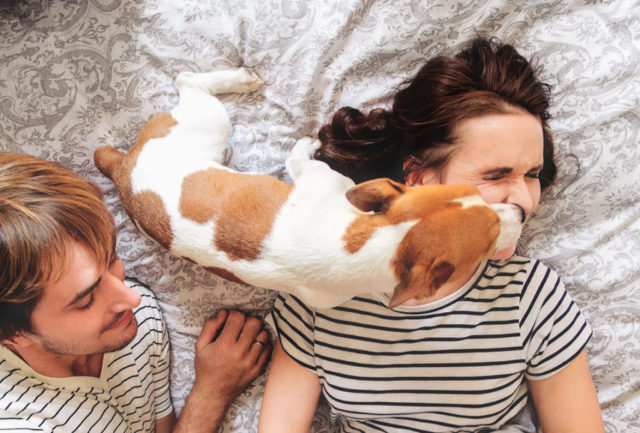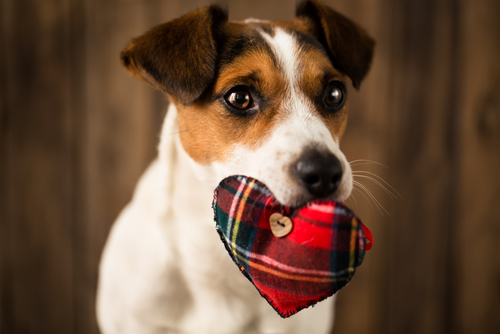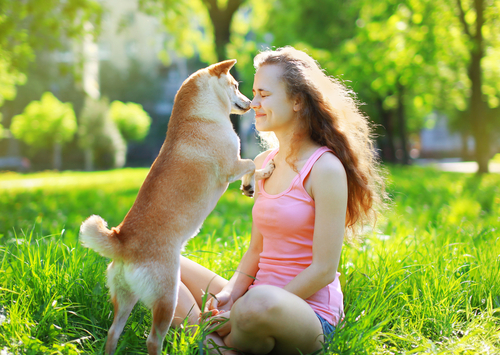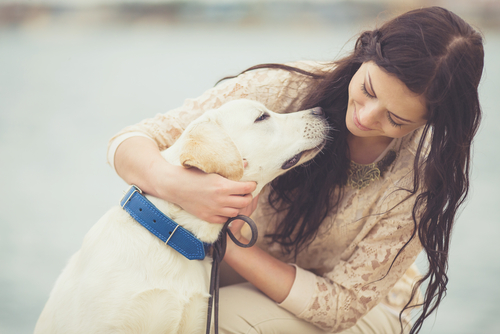
Dogs certainly have a way of bringing out the best in us. They read our emotions and provide quiet comfort or a good belly laugh when we need it most. Despite our shortcomings, they love us unconditionally, and would happily lay down their lives for us. With so many complex and admirable traits, it makes you wonder if your dog is really a human in disguise.
Or maybe it’s more accurate to say they are the humans we aspire to be. As Andy Rooney said, “The average dog is a nicer person than the average person.”

Here are five scientifically-proven signs your dog is basically just a “miniature buddha covered in hair!”
1. They are capable of complex emotions.
Through a series of social experiments and MRI imaging of the canine brain, scientists have made some remarkable discoveries about the emotional lives of dogs.


A 2014 study reported in Current Biology used MRI technology to show that dogs can detect variations in tone and mood in the voices of fellow dogs and humans. They have a mechanism for processing emotional voice cues similar to that of humans which is a strong indicator they are capable of empathy. Not that pup parents need science to convince them of this. All the nudging and tear-licking when we are sad is proof enough!
Another significant experiment involves the Oxytocin-gaze positive loop most commonly seen between a mother and newborn baby. Oxytocin is a hormone associated with love and bonding. The study found that just like new parents and couples in love, this hormone increases when dogs gaze into the eyes of their favorite humans.
In addition to these positive emotional responses, you can tell your dog is really a human by his capacity for jealousy. The University of Vienna sought to find out whether dogs feel jealousy by having two pups simultaneously perform the same command. One dog was consistently rewarded for his efforts while the other was not. As expected, the dog who did not receive treats refused to continue responding to commands.
Another social experiment found that canine subjects display more “jealous-like traits” (such as snapping or wedging between the owner and the object) when their owners pay attention to a fake dog than when they show attention to “non-social objects” (such as books or toys).


2. They mimic your actions and facial expressions.
Humans and primates have a social trait known as “emotional contagion.” This is why we yawn when our coworker yawns or smile at cooing babies. Our brains are hardwired to match the emotions and physical expressions of our fellow humans. It is a social evolution showing our capacity for empathy.
It turns out dogs perform the same kind of social mimicry with one another. We already know our pups can sense our moods, but they also take it a step further. Studies show they actually read the emotions in our facial and body expressions and match them.


3. They look you in the eyes.
Dogs rarely make eye contact with one another. They may lock eyes for a few seconds during play, but outside these encounters they typically see it as a challenge. However, over their thousands of years as companions to humans, dogs have adapted to looking us in the eyes.
Through close observation, dogs learn our likes and dislikes. Humans tend to see eye contact a sign of respect and an important means of communication. Since your dog is really a human, he adapts to this behavior in order to please you. From there, the remarkable Oxytocin gaze-positive loop develops and you find yourself madly in love with the furry genius at your feet!


4. They hold grudges.
Now that we know dogs are capable of complex human feelings – both positive and negative – it stands to reason they can be a bit spiteful. Although they do not form long-term memories in the same way we do, they have what’s referred to as “associative memories.” They associate their experiences with a specific emotion, such as fear during vet visits.
A 2017 study testing whether dogs hold grudges found that pups will refuse to take treats from people they witness being “mean” or unhelpful to their owners. However, the same dogs will eat from the hands of those they see helping their humans.
Clearly our dogs have our backs!

5. They love you just as much (or more) than your human friends.
We often refer to dogs as “man’s best friend,” but maybe it’s time for a better comparison. After all, I know for a fact my human best friend wouldn’t sacrifice her life to save mine. I’m not even sure she’d risk breaking a nail for me! Yet our canine “best friends” perform stunning acts of heroism on our behalf every day.
A quick search of the iHeartDogs catalog reveals dozens of stories involving dogs saving humans from rattlesnakes, alligators, bears, house fires, armed intruders, medical emergencies and more. Why do they do this?
Some cynics believe dogs are not capable of love; that they only act like they care for us to ensure we keep feeding and sheltering them. If dogs only use us to survive, they would never put their lives on the line for us. If survival were the ultimate goal, they would escape the burning houses, run from the gators, and hide from the robbers without a second thought for our wellbeing.


Dogs selflessly risk life and limb for us – and we know they aren’t doing it for the publicity! The only possible conclusion is that they truly love us. Maybe our dogs really are human. If so, they certainly represent the best of us! Either way it’s time to update “dogs are man’s best friend” to something more accurate. I think “dogs are family” says it all.
Do you want a healthier & happier dog? Join our email list & we’ll donate 1 meal to a shelter dog in need!
Be the first to comment